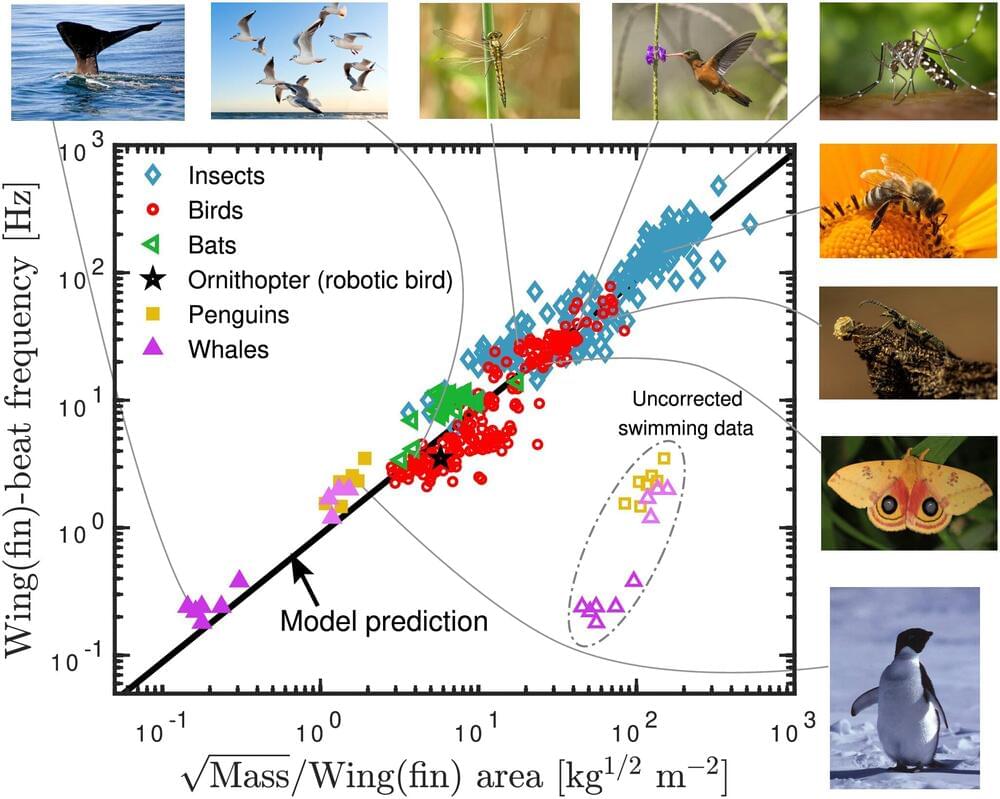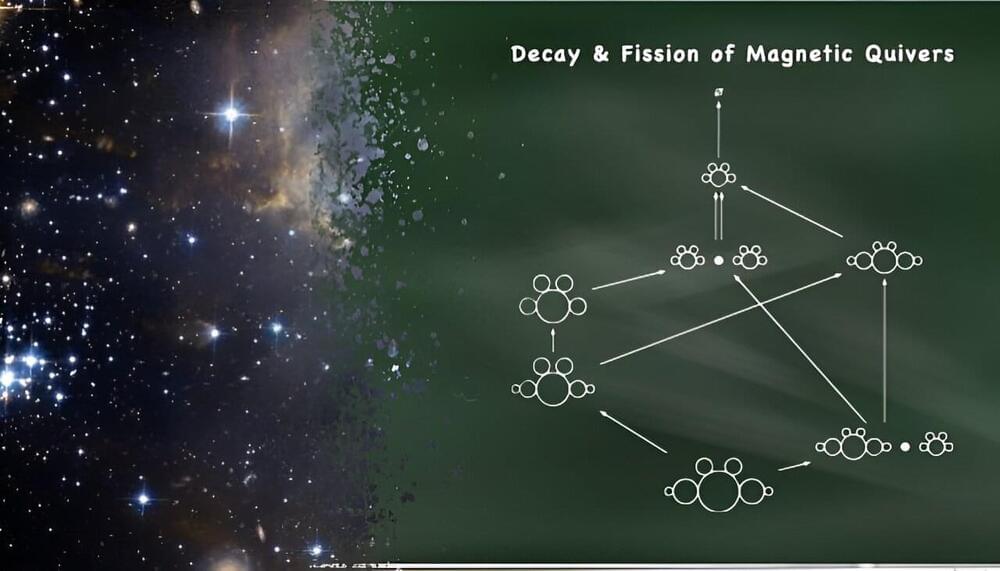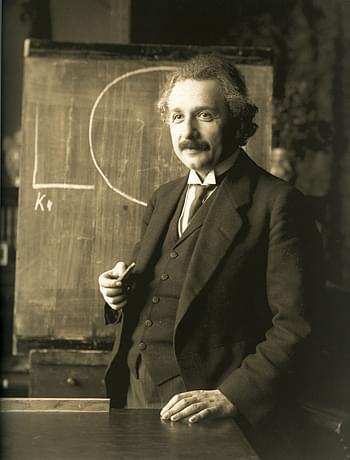They had to throw away most of what it produced but there was gold among the garbage.



A single universal equation can closely approximate the frequency of wingbeats and fin strokes made by birds, insects, bats and whales, despite their different body sizes and wing shapes, Jens Højgaard Jensen and colleagues from Roskilde University in Denmark report in a new study published in PLOS ONE on June 5.
The ability to fly has evolved independently in many different animal groups. To minimize the energy required to fly, biologists expect that the frequency that animals flap their wings should be determined by the natural resonance frequency of the wing. However, finding a universal mathematical description of flapping flight has proved difficult.
Researchers used dimensional analysis to calculate an equation that describes the frequency of wingbeats of flying birds, insects and bats, and the fin strokes of diving animals, including penguins and whales.
ICTP lectures “Topology and dynamics of higher-order networks”
- Network topology: 1 https://youtube.com/watch?v=mbmsv9RS3Pc&t=7562s.
- Network topology:2 https://youtube.com/watch?v=F6m5lPfk5Mc&t=3808s.
-Network geometry.
Topological Dirac equation and Discrete Network Geometry-Metric cohomology Speaker: Ginestra Bianconi (Queen Mary University of London) Higher-order networks [1] capture the many-body interactions present in complex systems and are dramatically changing our understanding of the interplay between topology of and dynamics. In this context, the new field of topological signals is emerging with the potential to significantly transform our understanding of the interplay between the structure and the dynamics in complex interacting systems. This field combines higher-order structures with discrete topology, discrete topology and dynamics and shows the emergence of new dynamical states and collective phenomena. Topological signals are dynamical variables, not only sustained on the nodes but also on edges, or even triangles and higher-order cells of higher-order networks. While traditionally network dynamics is studied by focusing only on dynamical variables associated to the nodes of simple and higher-order networks topological signals greatly enrich our understanding of dynamics in discrete topologies. These topological signals are treated by using algebraic topology operators as the Hodge Laplacian and the discrete Dirac operator. Recently, growing attention has been devoted to the study of topological signals showing that topological signals undergo collective phenomena and that they offer new paradigms to understand on one side how topology shape dynamics and on the other side how dynamics learns the underlying network topology. These concepts and idea have wide applications. Here we cover example of their applications in mathematical physics and dynamical systems. The field is topical at the moment with many new results already established and an already rich bibliography, therefore it is very timely to propose a series of lectures on the topic to introduce new scientists to this emergent field. Here we propose a series of lectures for a broad audience of scientists addressed mostly to physicist and mathematicians, but including also computer scientists and neuroscientists. The course is planned to be introductory, and self-contained starting from minimum set of prerequisites and focus mostly on the mathematical physics aspect of this field. The course will cover 4 lectures and 1 seminar. Ref: [1] Bianconi, G.: Higher-order networks: An introduction to simplicial complexes. Cambridge University Press (2021). [2] Bianconi, G., 2021. The topological Dirac equation of networks and simplicial complexes. Journal of Physics: Complexity, 2, p.035022.[3]Bianconi, G., 2023. The mass of simple and higher-order networks. Journal of Physics A: Mathematical and Theoretical, 57, p.015001.[4] Bianconi, G., 2024. Quantum entropy couples matter with geometry. arXiv preprint arXiv:2404.08556.[5] Millán, A.P., Torres, J.J. and Bianconi, G., 2020. Explosive higher-order Kuramoto dynamics on simplicial complexes. Physical Review Letters, 124(21), p.218301.




Recently, a team of chemists, mathematicians, physicists and nano-engineers at the University of Twente in the Netherlands developed a device to control the emission of photons with unprecedented precision. This technology could lead to more efficient miniature light sources, sensitive sensors, and stable quantum bits for quantum computing.

GPT4 can score better than 95% of the average human on aptitude tests.
The GPT-4 language model recently completed the Scholastic Aptitude Test (SAT), achieving a verbal score of 710 and a math score of 690, resulting in a combined score of 1400. Based on U.S. norms, this corresponds to a verbal IQ of 126, a math IQ of 126, and a full-scale IQ of 124. If taken at face value, one might conclude that GPT-4 surpasses 95% of the American population in intelligence and is approximately as intelligent as the average doctoral degree holder, medical doctor, or attorney.
However, the question remains: Is administering an IQ test to GPT-4 a valid undertaking or a significant categorization mistake?
Noncommutative probability and categorical structure Quantum-like revolut…
Take courses in science, computer science, and mathematics on Brilliant! First 30 days are free and 20% off the annual premium subscription when you use our link ➜ https://brilliant.org/sabine.
The rate at which the universe is currently expanding is known as the Hubble Rate. In recent years, different measurements have given different results for the Hubble rate, a discrepancy between theory and observation that’s been called the “Hubble tension”. Now, a team of astrophysicists claims the Hubble tension is gone and it’s the fault of supernovae data. Let’s have a look.
Paper: https://iopscience.iop.org/article/10…
🤓 Check out my new quiz app ➜ http://quizwithit.com/
💌 Support me on Donorbox ➜ https://donorbox.org/swtg.
📝 Transcripts and written news on Substack ➜ https://sciencewtg.substack.com/
👉 Transcript with links to references on Patreon ➜ / sabine.
📩 Free weekly science newsletter ➜ https://sabinehossenfelder.com/newsle…
👂 Audio only podcast ➜ https://open.spotify.com/show/0MkNfXl…
🔗 Join this channel to get access to perks ➜
/ @sabinehossenfelder.
🖼️ On instagram ➜ / sciencewtg.
#science #sciencenews #cosmology